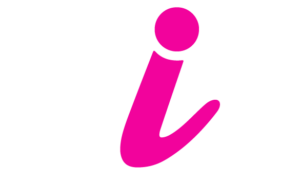Using Data and Analytics to Drive Sales Success
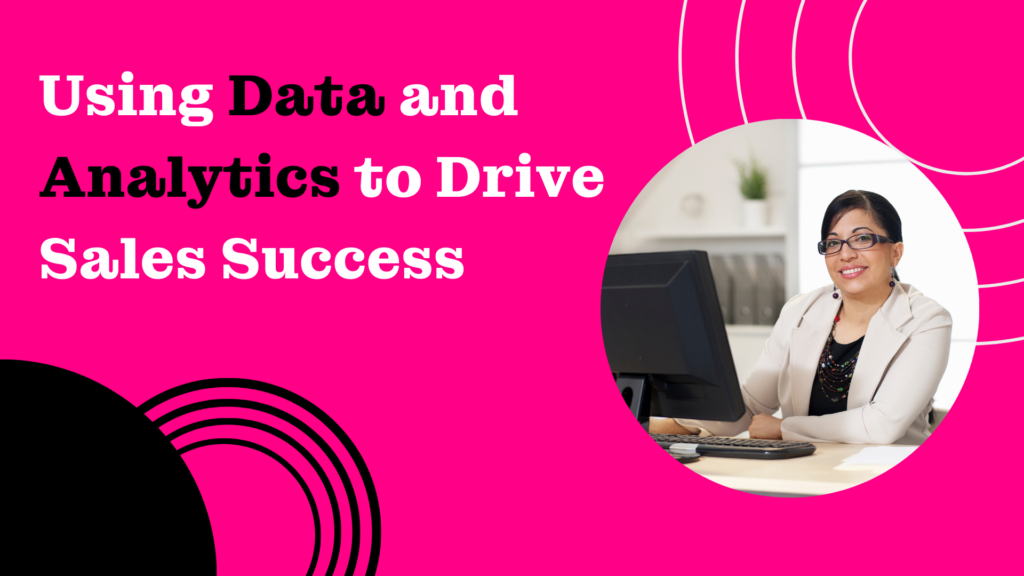
Data has been hailed as the backbone of modern sales strategies for years. Yet, the sheer volume of data available can often feel overwhelming, leaving many sales professionals unsure of how to make it work for them. While data has the power to revolutionize sales, its real value comes when salespeople know how to use it effectively: tracking the right metrics, understanding their implications, and steering clear of vanity metrics that don’t contribute to meaningful outcomes. Let’s explore how you can transform data into a tool for sales success. Focus on the Metrics That Matter The first step in harnessing data’s power is understanding which metrics truly matter. Not all numbers are created equal, and chasing the wrong ones can lead to wasted effort. Key Metrics to Track: Metrics like revenue growth, conversion rates, pipeline velocity, and customer lifetime value directly impact your bottom line and help identify where to focus efforts. Diagnostic vs. Vanity Metrics: Diagnostic metrics, such as win/loss ratios and lead response times, reveal areas for improvement and guide your strategy. On the other hand, vanity metrics, like the total number of emails sent, might look impressive but rarely provide actionable insights. Tailor Metrics to Your Goals: What works for one team may not work for another. Align metrics with your sales goals and your customer’s journey to keep your focus sharp. Making Data Work for You Once you know which metrics to prioritize, the next step is turning that information into action. Prioritize High-Impact Data: Use CRM systems to filter and analyze data that drives results. For instance, prioritize leads with high engagement scores or repeat purchase history. Translate Insights Into Strategy: Data is only as good as the actions it informs. If your analysis shows low conversion rates at a specific stage of the funnel, focus your efforts there—whether that means refining your pitch or adjusting your follow-up cadence. Simplify Interpretation: Dashboards can help visualize key metrics, making it easier to focus on actionable insights without getting bogged down in numbers. Tools like Salesforce dashboards or Tableau simplify this process. Tools to Streamline Your Analytics The right tools can make a world of difference when managing data. CRMs like Salesforce or HubSpot are indispensable for tracking customer interactions, while analytics tools like Power BI, Tableau, and Zoho Analytics can help you interpret trends and results. Automation features in these tools can also reduce the manual labor of data entry, freeing you to focus on selling. Avoiding the Pitfalls of Too Much Data While data is invaluable, it can also be a double-edged sword if not managed correctly. Data Paralysis: Too much data can lead to inaction. Focus on 3–5 key metrics aligned with your goals to maintain clarity. Inconsistent Data: Dirty data—duplicate entries or incorrect details—can skew your analysis. Regular maintenance is crucial. Chasing Vanity Metrics: Avoid metrics that don’t drive decisions or align with your goals. Keep your focus on the ones that truly impact performance. Data-Driven Support with SIS Navigating the world of data can feel daunting, but you don’t have to do it alone. Through Sistas in Sales (SIS), you gain access to resources that simplify the process: Workshops on the metrics that matter most in sales. Insights from seasoned sales professionals who’ve mastered data usage. A supportive community eager to share tools, tips, and best practices for leveraging analytics. Empowering Your Sales Career Through Data Data can be your greatest ally in sales—if you let it. By focusing on meaningful metrics, leveraging the right tools, and turning insights into action, you can move from feeling overwhelmed to empowered. The key is to start small: pick one or two metrics to focus on, and build your confidence from there. Ready to master data-driven sales strategies? Join Sistas in Sales to gain access to exclusive resources, learn from industry leaders, and take your sales game to the next level. Together, we can turn data into your most powerful sales tool.
Effective Sales Pitch Techniques
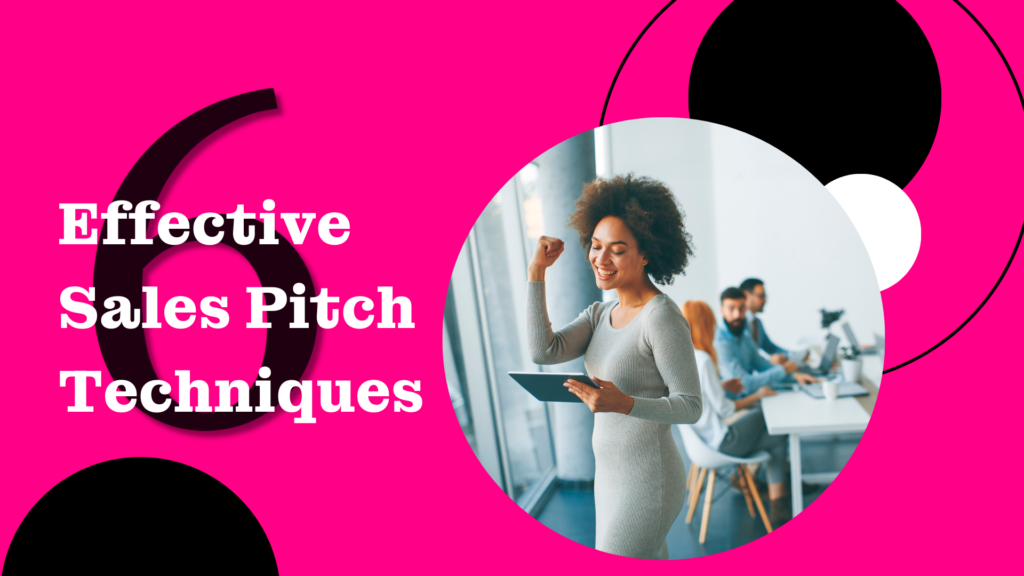
A compelling sales pitch can be the key to closing deals, building trust, and setting yourself apart in a competitive sales environment. It’s more than just presenting a product or service—it’s about connecting with your audience, solving their problems, and leaving a lasting impression. To create a pitch that sticks, you need strategy, storytelling, and skillful delivery. Here’s how to craft and deliver an effective sales pitch that drives results. Understand Your Audience Inside and Out Before you pitch, you need to understand who you’re talking to and what matters most to them. Tailoring your approach to the audience’s needs increases the likelihood of a successful outcome. Do Your Research: Dig into your prospect’s company, their industry, and their pain points. What challenges do they face? How can your solution help them succeed? Ask Questions: If you have the opportunity, gather insights during pre-pitch conversations to identify their goals and concerns. Make It Personal: Avoid generic messaging. Address your audience’s specific situation and show that you understand their world. For instance, McKinsey highlights the importance of creating customer-centric sales strategies that focus on addressing real needs rather than pushing products blindly. Lead with Value, Not Features The best pitches don’t dwell on technical details—they focus on value. Prospects care less about what your product does and more about how it will help them succeed. Focus on Outcomes: Start with the end result. How will your product or service make their life easier, improve revenue, or solve a pressing problem? Share Tangible Results: Use numbers or specific benefits to illustrate impact. For example, “Our platform increases pipeline visibility, helping teams close 20% more deals in half the time.” Connect Emotionally: Value isn’t always about money. Talk about saving time, reducing stress, or gaining a competitive edge. The key is to make prospects see how your solution will help them win. Research by HubSpot indicates that tying value to a buyer’s personal goals and company objectives creates stronger engagement. Tell a Story That Resonates People remember stories more than statistics. Stories make your pitch relatable, engaging, and memorable. They help you move beyond selling and into connecting. Problem → Solution → Success: Frame your pitch around a clear story structure. Share a challenge faced by a similar client, how you helped them, and the success they achieved. Include Real People: Use customer testimonials, anecdotes, or case studies to make your story authentic. Make It Vivid: Describe the situation with detail, but keep it concise. Use emotional or visual language to help prospects see the story unfold. A good story doesn’t just share results—it helps your audience imagine themselves achieving similar success. Perfect Your Delivery The most thoughtful pitch will fall flat if your delivery isn’t strong. Confidence, clarity, and charisma can take a good pitch to the next level. Practice, Practice, Practice: Rehearse until you’re comfortable. Anticipate potential questions and prepare responses to maintain control of the conversation. Be Clear and Concise: Respect your prospect’s time. Keep your pitch direct and focus on what matters most to them. Engage Your Audience: Ask questions, make eye contact (if virtual, turn on your camera!), and watch for body language cues to adapt in real time. End with a Strong CTA: A clear next step keeps the conversation moving. Whether it’s booking a follow-up meeting, sharing a proposal, or trying out a demo—make the ask. Adapt to Virtual Sales Environments With virtual meetings now the norm, sales professionals must adapt their techniques for digital platforms. Turn Your Camera On: Your prospects want to see a real person, not just hear a voice. Seeing your energy and body language fosters trust and connection. Optimize Your Setup: Use good lighting, a clean background, and a strong internet connection to maintain professionalism. Engage Virtually: Use tools like polls, visuals, or live demos to hold attention and keep prospects actively involved. SIS Sponsor Gartner has research illustrating that virtual selling is here to stay, with 80% of B2B interactions now occurring online. The ability to master virtual delivery will set top sellers apart. Follow Up with Impact Your pitch doesn’t end when the meeting does. A strong follow-up can reinforce your message, address concerns, and keep the momentum going. Summarize the Conversation: Send a recap email highlighting key takeaways, next steps, and your value proposition. Personalize Your Follow-Up: Reference specific points from the conversation to show you were listening and tailor the message to their goals. Provide Additional Value: Share case studies, articles, or product information that further supports how you can solve their problems. Effective follow-ups show that you’re proactive and invested in their success, increasing the likelihood of a positive outcome. Master Your Pitch with SIS An effective sales pitch combines preparation, value, storytelling, and strong delivery. Whether you’re pitching virtually or in person, these techniques will help you connect with your audience and close more deals. Looking to sharpen your sales pitch further? Join the Sistas In Sales (SIS) community for exclusive resources, coaching, and mentorship opportunities that help you elevate your sales game and achieve your goals.
Overcoming Imposter Syndrome in Sales
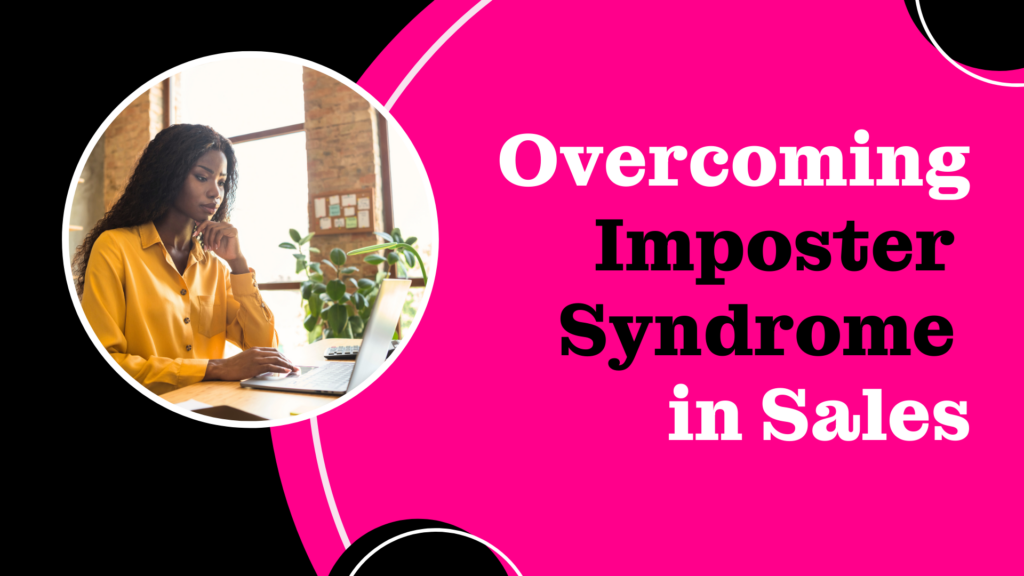
Imposter syndrome is a silent struggle that many sales professionals face—particularly women of color navigating a high-pressure, performance-driven environment. You may be hitting your quotas, closing deals, and earning recognition, but still feel like you don’t belong or that your success is just a fluke. If this resonates, you’re not alone: research shows that up to 70% of professionals experience imposter syndrome at some point in their careers, regardless of skill level or achievements. Sales can feel like a very high-pressure world, where targets are high-stakes, rejection is frequent, and competition is fierce, which means that feelings like imposter syndrome can hit even harder. For women of color in sales—where representation in leadership remains disproportionately low—imposter syndrome can be compounded by external biases, microaggressions, and systemic challenges. The good news? These feelings are not a reflection of your abilities, and you can overcome them with intention, awareness, and a strong support system. Let’s break down how to identify imposter syndrome, understand why it thrives in sales, and adopt strategies to quiet self-doubt so you can show up as your most confident self. How to Identify Imposter Syndrome Imposter syndrome shows up in subtle but familiar ways: Feeling like you don’t “belong” in sales or at the table. Dismissing your successes as luck or timing instead of acknowledging your skill. Avoiding challenges out of fear of failure, or overworking to “prove” your worth. Feeling unqualified even when you’ve earned your role and results. For example, you might close a significant deal but tell yourself, “It was just luck” or “The client was easy.” Maybe you hesitate to speak up in meetings or struggle with comparing yourself to top performers, even when you’ve achieved success in your own right. If these thoughts sound familiar, remember: self-doubt doesn’t mean you’re incapable—it’s a signal to build your confidence from within. Why Imposter Syndrome Persists in Sales Sales is an industry where performance is measured constantly, which can amplify feelings of inadequacy: High Pressure: The pressure to hit quotas month after month can make even top performers doubt themselves. Constant Comparison: Seeing colleagues celebrate big wins or seeing names at the top of the leaderboard can fuel unfair comparisons. External Challenges: For women of color, the absence of mentors or representation in leadership can reinforce feelings of being an “outsider.” Rejection Culture: Sales comes with regular “no’s”—and without resilience, it’s easy to let rejection chip away at confidence. Add to this the reality that many professionals don’t openly discuss these struggles. However, research confirms that recognizing and addressing imposter syndrome head-on can have a tangible impact on performance and well-being source. Strategies to Overcome Imposter Syndrome in Sales Track and Celebrate Your Wins: Keep a record of your successes—no matter how big or small. Whether it’s a major deal closed, positive client feedback, or a milestone hit, write it down. A “wins journal” can remind you that your achievements are earned, not luck. Reframe Negative Thoughts: Challenge your inner critic and replace self-defeating thoughts with affirming ones: Instead of “I got lucky,” say, “I worked hard to close this deal.” Instead of “I don’t know enough,” remind yourself, “I’m learning, growing, and showing up every day.” Invest in Yourself: Confidence comes from preparation and growth. Seek out workshops, training sessions, and resources to sharpen your skills. By investing in yourself, you strengthen your sense of competence. Events like the Aspiring Sellers Summit provide tools, mentorship, and community to help you navigate your sales journey with confidence. Find Mentors and Community: Having mentors or a supportive community can make all the difference in overcoming imposter syndrome. Mentors provide guidance, affirmation, and real-world advice for navigating challenges. Communities like Sistas in Sales offer a safe space to connect, learn, and grow alongside peers who understand your experience. Progress Over Perfection: Sales is all about persistence and improvement—not perfection. Focus on progress and growth: Break big goals into smaller milestones. Celebrate every step, even if it’s incremental. The path to success is rarely linear, and no one expects you to be perfect. By showing up consistently, you’re building a foundation for long-term success. Building Confidence in Your Sales Role Confidence in sales isn’t just about “faking it till you make it.” It’s about: Trusting your skills and preparation. Embracing challenges as learning opportunities. Reminding yourself that you’ve earned your place, no matter how loudly self-doubt tries to speak. Representation matters, too. Seek out the stories of trailblazing women in sales who have paved the way. Let their journeys inspire you to recognize your own potential and remember: you are not alone. You Belong Here Imposter syndrome is a common hurdle, but it’s not an immovable barrier. By tracking your wins, challenging self-doubt, leaning on mentors, and committing to your growth, you’ll develop the confidence and resilience needed to thrive in sales. At Sistas in Sales, we’re committed to providing resources, events, and a supportive community to help you overcome challenges and achieve your goals. Join us in rewriting the narrative—because you do belong here, and your success is well-deserved. Ready to connect, learn, and grow with women who get it? Explore the tools and community waiting for you through SIS membership today.
Balancing Work and Life: Tips for Sales Professionals
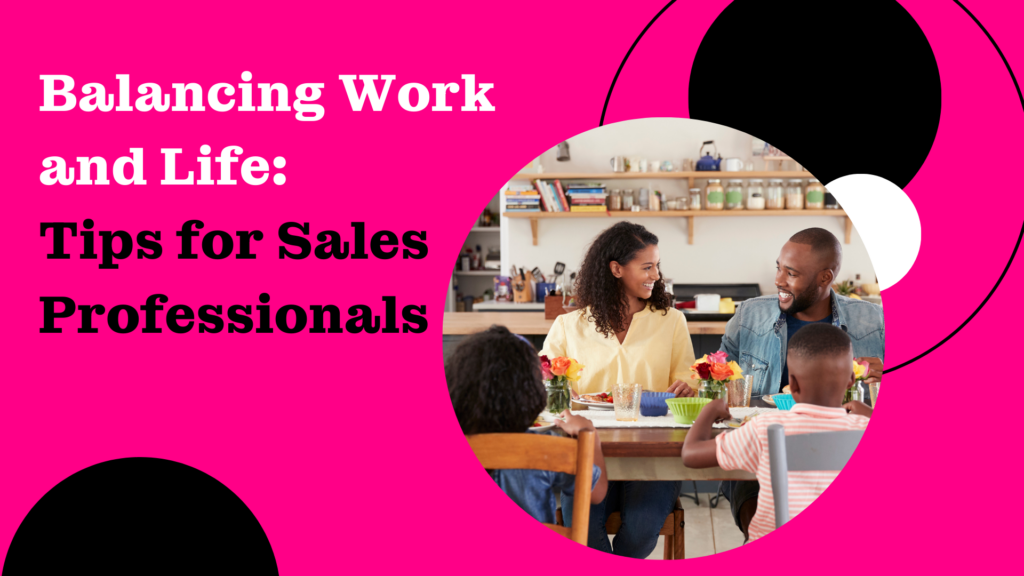
Working in sales often feels like being on an endless treadmill—calls, emails, follow-ups, client meetings, and the constant pressure of hitting your numbers. It’s a career that rewards hustle, but without balance, that hustle can quickly turn into exhaustion. Finding work-life balance is not a luxury—it’s essential for long-term success, mental well-being, and career satisfaction. Set Clear Boundaries Between Work and Life The pressure to always be “on” can blur the line between your professional and personal life. Without boundaries, it’s easy to burn out or feel perpetually tethered to work. Start by setting defined work hours and sticking to them. If you’re done at 6 p.m., step away and let your clients and colleagues know you’ll pick things up the next day. Create physical and digital boundaries too—turn on “do not disturb” settings on your devices, close your email when you’re off the clock, and make sure your workspace is separate from your living area whenever possible. By consistently honoring these boundaries, you’ll show others (and yourself) that balance matters. Master Time Management to Work Smarter Sales professionals know that time is money, but managing it effectively is easier said than done. Use time-blocking strategies to organize your day into focused work segments—prospecting, client calls, follow-ups, and admin tasks—while building in time for breaks. It’s equally important to prioritize the tasks that drive the most results. Apply the 80/20 rule: 20% of your tasks will generate 80% of your impact. Focus on high-value activities that move you closer to your goals and delegate or automate tasks that don’t require your attention. Productivity tools like CRMs, calendars, and task management software can help streamline your efforts. Prioritize Self-Care to Boost Energy and Focus It’s a common misconception that pushing through fatigue shows dedication. In reality, neglecting your well-being hurts both your personal health and professional performance. Small acts of self-care throughout your day can make a huge difference. Take real breaks: step away from your screen, stretch, or take a walk. Prioritize getting enough sleep, staying hydrated, and incorporating exercise—even if it’s just a quick 10-minute routine. When you feel physically and mentally recharged, you show up sharper, more focused, and ready to win. Find Strength in Community Navigating the demands of a sales career is far easier when you’re surrounded by people who understand what you’re going through. Build connections with peers and mentors who can share advice, provide support, and offer fresh perspectives. Whether it’s brainstorming strategies, working through challenges, or celebrating wins, community makes a difference. Joining organizations like Sistas in Sales can provide invaluable access to resources, events, and a network of women of color who empower one another. In spaces like these, mentorship thrives, knowledge is shared, and professional relationships turn into lifelong bonds. Redefine Success Beyond the Numbers Success in sales often comes down to hitting targets and closing deals, but true success is about sustainability, growth, and personal well-being. Shift your mindset to celebrate progress instead of chasing perfection. Small wins—like building stronger client relationships, achieving personal goals, or learning new skills—are just as important as the numbers you hit. When you focus on steady, sustainable growth, you’ll reduce pressure, create healthier habits, and find more fulfillment in your work. Achieving Balance Makes You Better at What You Do Balancing work and life doesn’t have to mean working less—it means working more intentionally. When you prioritize your time, honor boundaries, and invest in your well-being, you’ll perform at your best. If you’re looking for additional tools to thrive in your career while maintaining balance, consider joining Sistas in Sales. As part of our community, you’ll gain access to mentorship opportunities, professional development events, and a network of women who support your growth. Together, we’re redefining what success looks like—one career at a time. Sales is a marathon, not a sprint. By striving for balance, you’ll ensure you have the energy, focus, and resilience to reach the finish line—and beyond.
The Importance of Emotional Intelligence in Sales
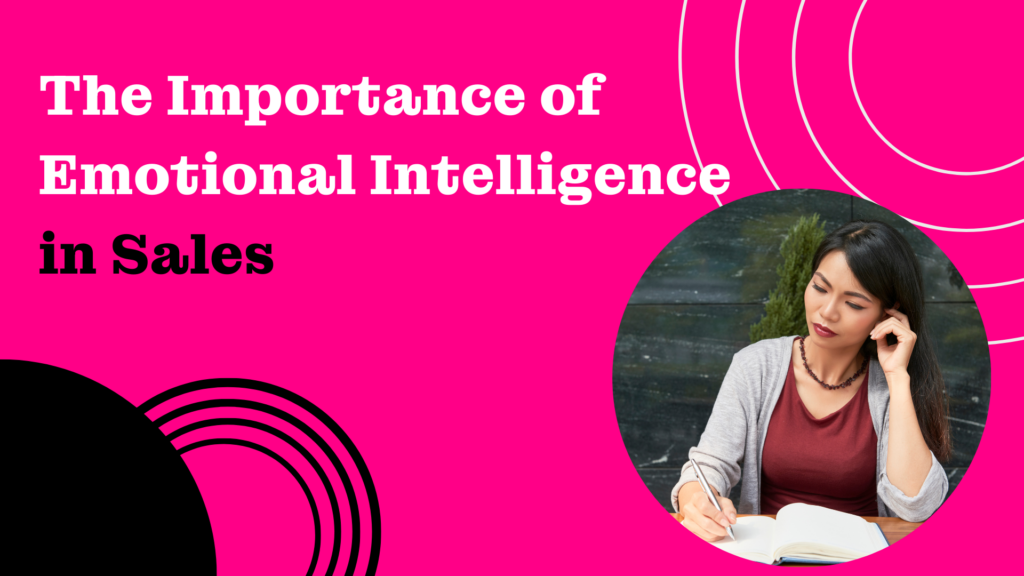
Emotional intelligence (EQ) is a critical, often underestimated skill that separates top-performing sales professionals from the rest. It’s about more than just understanding products or delivering a polished pitch—success in sales requires the ability to connect, empathize, and respond to people on a human level. With EQ, salespeople can navigate complex client relationships, overcome challenges, and build trust that lasts. Let’s dive into why emotional intelligence matters in sales, the key components of EQ, and how you can develop this skill to elevate your career. Why Emotional Intelligence Matters in Sales Sales is, at its core, about relationships. Emotional intelligence gives sales professionals the tools to nurture these relationships, foster trust, and deliver solutions that meet a client’s emotional and business needs. Building Strong Relationships: Clients don’t just buy products—they buy into relationships. EQ helps you connect with clients more authentically, earning their trust and loyalty. Understanding Client Needs: Emotional cues can reveal a client’s true concerns or priorities. By listening closely and responding with empathy, you’ll uncover opportunities to deliver real value. Handling Rejection and Objections: No one wins every deal, but high EQ allows salespeople to manage rejection gracefully, bounce back with resilience, and turn setbacks into learning moments. Team Success: Emotional intelligence fosters stronger collaboration within sales teams. Better communication and mutual understanding help everyone succeed. The Key Components of Emotional Intelligence in Sales Emotional intelligence is made up of five core components, each playing a vital role in sales interactions. Self-Awareness Recognizing your own emotional triggers, strengths, and weaknesses is the foundation of EQ. Self-aware sales professionals can adapt their approach, stay calm, and connect with clients more effectively. Self-Regulation When a sales call goes sideways or a client raises objections, EQ enables you to stay composed and professional. Self-regulation means managing your emotional responses—staying calm under pressure and keeping frustration in check. Empathy Empathy is the ability to understand and share the feelings of another person. In sales, it’s about putting yourself in your client’s shoes—asking thoughtful questions, actively listening, and validating their concerns to show you truly care about their success. Social Skills From building rapport to negotiating deals, strong social skills are essential for navigating client relationships. EQ helps you read emotional cues, adapt your tone, and connect in a way that feels natural and genuine. Motivation Sales comes with highs and lows, but emotionally intelligent professionals are driven by intrinsic motivation. They focus on their goals, stay resilient through challenges, and find ways to inspire themselves and others. Emotional Intelligence in Action EQ isn’t just theoretical—it plays out in everyday sales interactions. Here are a few examples: Turning Frustration into Trust: A client comes to you frustrated with a service issue. By validating their concerns, showing empathy, and providing a tailored solution, you not only resolve the issue but earn their trust. Responding to Rejection: After losing a big deal, you stay positive, seek constructive feedback, and identify ways to improve for next time. Building Deeper Connections: During a pitch, you pick up on the client’s hesitations through tone or body language. By asking the right questions, you uncover hidden pain points and provide a solution they hadn’t even considered. These real-world scenarios demonstrate that emotional intelligence isn’t just “nice to have”—it’s a critical tool for success. How to Develop Emotional Intelligence for Sales Success The good news is that emotional intelligence can be developed over time with practice and intention. Practice Active Listening: Instead of planning your response while the client is speaking, focus fully on understanding their words, tone, and body language. This helps you respond thoughtfully and show genuine interest. Increase Self-Awareness: Take time to reflect after meetings or calls. What went well? How did you handle challenges? Identify emotional triggers and areas for improvement. Empathy Training: Work on asking open-ended questions that invite clients to share their concerns. Respond with validation, not defensiveness. Manage Stress and Rejection: Build coping strategies like mindfulness, exercise, or journaling to stay calm under pressure. Seek Feedback: Ask colleagues, mentors, or even clients how you come across in meetings. Honest feedback can help you grow your EQ. The Long-Term Benefits of EQ in Sales Mastering emotional intelligence isn’t just about improving this quarter’s numbers—it delivers long-term benefits that can transform your sales career. Higher Client Retention: Clients want to work with sales professionals who listen, care, and deliver value. Strong EQ fosters loyalty and trust. Better Close Rates: Understanding and adapting to client emotions gives you an edge in negotiations and helps you close more deals. Stronger Team Collaboration: EQ improves communication and connection within sales teams, leading to better teamwork and results. Personal and Professional Growth: Developing EQ not only elevates your career but also enhances your ability to handle stress, build relationships, and thrive in all areas of life. EQ Is Your Secret to Sales Success Emotional intelligence is the key to thriving in sales—helping you build deeper connections, handle challenges with resilience, and deliver value in every client interaction. At Sistas in Sales, we believe that EQ is a critical part of mastering the sales craft. Join our community to connect with other high-performing women of color in sales, access expert-led resources, and continue growing in your career. Ready to take your EQ—and your career—to the next level? Become a part of the SIS community today!
Tips for Virtual Sales Meetings & Pitches

In the era of remote work, virtual meetings have become the norm rather than the exception. Sales professionals are expected to excel in this environment, not just because it’s convenient but because it’s a vital way to connect with clients, expand networks, and close deals. Whether you’re pitching to a prospective client or meeting with a long-standing partner, how you present yourself virtually can make or break the sale. Here are actionable tips to help you master your next virtual sales meeting or pitch. 1. Preparation Is Your Foundation Preparation is the bedrock of any successful meeting, virtual or otherwise. Always Test Your Tech: Double-check your camera, microphone, and internet connection before the meeting. If you’re sharing your screen, ensure the files or tabs you need are ready to go. Set the Stage: Your background matters—choose a tidy, professional space. Use a virtual background only if it aligns with your brand and doesn’t distract from your message. Plan for Presence: Have your camera on. Let your prospects see your energy and connect with you as a real person. This visual connection builds trust, makes your body language visible, and allows you to read their reactions and adjust in real-time. Know Your Audience: Research your prospect thoroughly. Understand their pain points, goals, and how your solution aligns with their needs. 2. Build Connection from the First Click Building rapport virtually takes intention and effort. Start with Small Talk: Open with something light to ease into the conversation—compliment something about their work, mention a relevant topic, or simply ask how they’re doing. Engage Visually and Verbally: Make eye contact with the camera to simulate in-person connection. Use natural hand gestures and facial expressions to project confidence and warmth. Actively Listen: Nod, affirm, and ask follow-up questions to show you’re engaged and genuinely interested in what they’re saying. 3. Make Your Pitch Memorable Your presentation should capture attention and leave a lasting impression. Keep It Visual: Use slides, videos, or demos sparingly but effectively to complement your points. Visual aids should enhance, not overshadow, your narrative. Tailor Your Message: Speak directly to your prospect’s needs and highlight specific ways your product or service solves their unique challenges. Be Concise: Virtual environments amplify short attention spans. Get to the heart of your value proposition quickly and leave room for questions or discussion. 4. Overcome Objections with Grace Handling objections well demonstrates your expertise and builds trust. Listen First: Let your prospect fully express their concerns before responding. This shows respect and ensures you’re addressing the right issues. Acknowledge Valid Points: Agree where appropriate and provide solutions or reassurances tailored to their concerns. Come Prepared with Proof: Share success stories, case studies, or data to bolster your credibility. 5. Foster Engagement Throughout Keeping your audience involved ensures a productive and memorable meeting. Use Interactive Features: Leverage tools like polls, chat boxes, or collaborative whiteboards to engage your audience actively. Check for Understanding: Pause periodically to ask if they have questions or if they’d like further clarification on a point. Be Mindful of Energy Levels: If the meeting runs long, suggest a quick stretch break or find natural transition points to re-energize the conversation. 6. Follow Up to Seal the Deal The meeting may end, but the work doesn’t stop there. Send a Recap Email: Summarize key takeaways, clarify next steps, and attach any promised resources. Share Supporting Materials: Provide relevant case studies, a link to your product demo, or further reading that reinforces your pitch. Schedule a Next Step: Proactively propose a follow-up meeting or actionable next step while the momentum is fresh. Your Virtual Edge Virtual meetings may not be new, but their importance has never been greater. By presenting yourself professionally, connecting authentically, and communicating effectively, you can stand out in any sales scenario. With consistent practice and the right tools, virtual selling can become one of your strongest assets in today’s competitive landscape. Want more strategies to elevate your sales game? Join the Sistas in Sales community for access to exclusive resources, expert-led events, and a network of women committed to helping you achieve your goals. Unlock your potential with SIS—your next big breakthrough could be one connection away!
How Collaboration in Sales Drives Performance and Revenue Growth
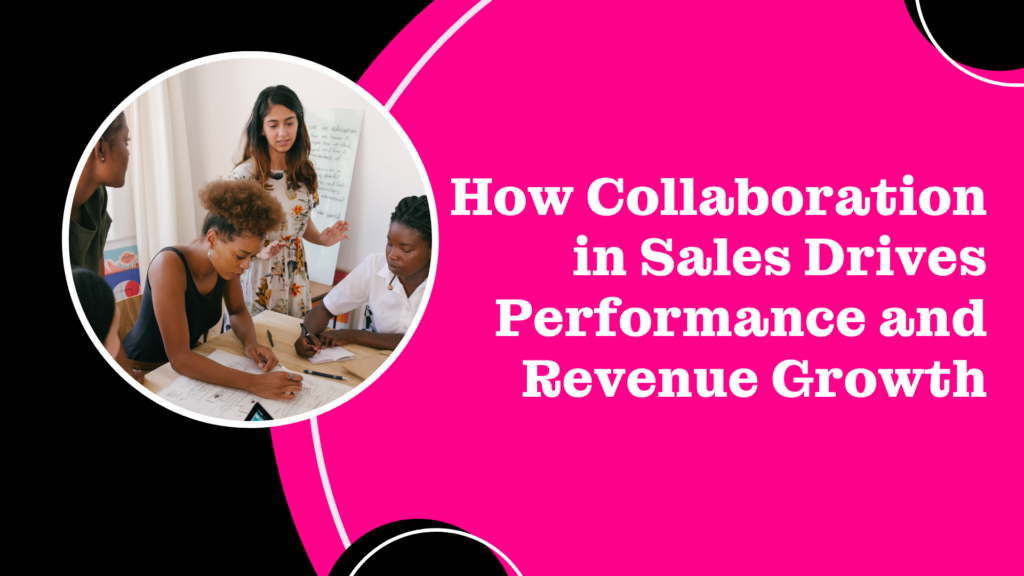
Sales is often seen as a competitive and individualistic field, but the most successful teams know the power of collaboration. A supportive and unified sales environment not only improves results but also fosters innovation, enhances relationships, and drives personal and professional growth. For women of color in sales, creating spaces of collaboration is especially impactful, offering community and shared knowledge in environments where representation can feel limited. The Challenges of Collaboration in Sales The inherent competitiveness of sales can make collaboration feel like a lower priority. Team members may focus on their individual goals, hesitate to share strategies, or struggle to build trust across departments. For underrepresented groups, these challenges can feel even more pronounced when systemic inequities limit access to allies or create additional barriers to success. Addressing these issues means building an environment that values all voices and prioritizes collective growth over individual competition. Key Components of a Collaborative Sales Environment Open Communication: Encourage transparent and constructive conversations. Create opportunities for team members to share strategies, ask questions, and celebrate wins in an environment that feels safe and supportive. Shared Goals: Unite your team under common objectives that recognize and reward both individual contributions and collective achievements. This builds alignment and fosters a stronger sense of community. Knowledge Sharing: Establish spaces and systems where lessons learned, successes, and best practices are easily shared. Whether through mentorship, team workshops, or informal check-ins, knowledge exchange strengthens everyone. Mutual Accountability: Build trust by creating a culture of shared responsibility. When team members support one another and hold each other accountable, they reinforce the importance of collaboration. Recognition and Incentives: Celebrate teamwork as much as individual success. Recognizing group achievements shows the value of collaboration and motivates your team to keep working together. Strategies to Build Collaboration Leverage Technology to Unite Teams: Implement tools that support seamless communication and collaboration, such as CRM platforms and project management systems. These tools can help break down barriers and make teamwork more efficient. Create Cross-Functional Partnerships: Encourage collaboration beyond the sales team by working with marketing, customer success, and product development. These relationships enhance the customer experience and generate more cohesive strategies. Solicit Feedback and Act on It: Regularly ask for team input through meetings, surveys, or one-on-one sessions. Feedback creates a two-way conversation that fosters trust and reveals opportunities for stronger collaboration. Lead with Transparency and Inclusion: Sales leaders play a critical role in setting the tone for collaboration. Demonstrate openness, encourage teamwork, and ensure that every team member feels their contributions are valued. The Benefits of Collaboration A collaborative sales environment delivers transformative benefits, including: Enhanced Creativity: Combining diverse perspectives inspires innovative ideas and problem-solving. Higher Efficiency: Teams reduce redundancies and streamline workflows by working together. Improved Morale: Employees feel supported and valued, increasing job satisfaction and retention. Stronger Results: Collaborative efforts often lead to higher sales and better customer outcomes. Building a collaborative sales environment takes intention, but the rewards are immense. It’s about creating a culture where every voice matters, where teamwork drives success, and where innovation thrives. For sales professionals, this approach transforms work from an individual challenge to a shared opportunity for growth. If you’re looking for more ways to connect, grow, and collaborate with like-minded professionals, join a community that prioritizes these values, like Sistas in Sales. Together, we can create a sales environment that truly supports success for everyone. Take the next step in building your collaborative network: Join a supportive community of sales professionals who are redefining the future of sales—together.
The Importance of Mentorship in Sales & How to Find a Mentor
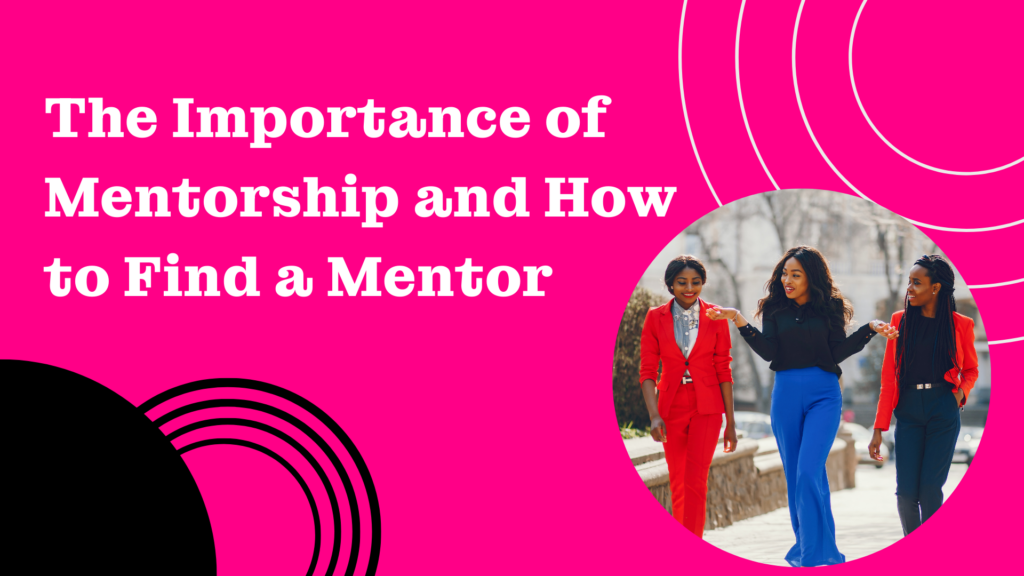
Mentorship is a powerful force in career advancement, especially for women of color navigating the sales industry, where we still have a dearth of women who look like us in leadership positions. Having a mentor means having someone in your corner to offer insights, guidance, and encouragement as you tackle new challenges and grow professionally. Research shows that mentorship can lead to higher confidence, valuable connections, and even faster promotions. Mentors provide wisdom that helps you avoid common pitfalls and learn strategies to thrive—empowering you to reach new heights in your career. Key Benefits of Having a Mentor Professional Growth and Skill Development: A mentor offers insights gained from experience, helping you sharpen the skills essential to success in your field. From honing your sales techniques to building confidence in client interactions, the guidance of a mentor can be transformative. Guidance and Support Through Challenges: Mentors help you navigate tough times. They offer solutions to workplace issues like overcoming bias or achieving work-life balance. With a mentor’s support, you can face and overcome the unique challenges that arise in your career. Building a Strong Network: A mentor is often well-connected, offering access to a network that might otherwise be difficult to reach. This can lead to job opportunities, introductions to other professionals, and an expanded professional circle that benefits your growth. Personal Development: Mentorship encourages growth beyond career achievements. A good mentor supports your journey toward resilience, mindfulness, and self-confidence, empowering you to bring your full self to work every day. Characteristics of a Good Mentor Relevant Experience: Look for a mentor who has worked in a similar field or role, as their insights will be especially relevant and actionable. Aligned Values: It’s crucial to find a mentor whose values reflect your own goals and aspirations. This alignment allows for trust and open communication. Willingness to Invest in Others: A mentor who genuinely enjoys helping others will make time for your questions, be attentive to your needs, and be dedicated to your success. Availability and Commitment: Make sure your mentor can commit to regular check-ins, whether weekly, monthly, or as your schedule allows. The best mentorship relationships have consistent communication and accountability. How to Find the Right Mentor Identify Your Goals: Before reaching out, define what you’re seeking in a mentor. Are you looking for industry knowledge? Help with skill development? Career advancement advice? Knowing your goals helps you identify the right fit. Explore Your Network: Sometimes, a mentor may already be in your existing network. Reach out to colleagues, LinkedIn connections, alumni groups, or communities like Sistas in Sales. SIS, in particular, offers a network of experienced professionals eager to support the next generation. Engage in Networking Events and Industry Meetups: Conferences, industry panels, and networking events provide excellent opportunities to connect with potential mentors. The annual SIS Summit, for example, brings together sales leaders and industry influencers, providing a perfect chance to build meaningful connections. Leverage Professional Organizations and Communities: Many organizations, including Sistas in Sales, offer formal mentorship programs or structured events that connect members with potential mentors who align with their career paths. Making the Ask: How to Approach a Potential Mentor Start with Respectful Outreach: When you reach out, express why you admire their work and how you think mentorship with them could be mutually rewarding. Personalize your message and share specific reasons why you see them as a fit. Define Your Expectations: Be clear about what you hope to gain from the mentorship. Whether it’s bi-weekly check-ins or advice on certain projects, defining expectations upfront helps establish a productive relationship. Show Your Commitment: Demonstrate your dedication to making the most of their mentorship. Come prepared to meetings, follow up on advice, and apply what you learn. This shows your respect for their time and dedication to growth. Tips for Building a Successful Mentor-Mentee Relationship Communicate Regularly and Consistently: Schedule regular check-ins to maintain a steady rhythm and build rapport. Consistent communication allows for meaningful feedback and deeper engagement. Stay Open to Feedback: Mentorship is a growth experience, so be prepared to hear constructive feedback. Embrace their insights, even if it means stepping out of your comfort zone. Show Appreciation and Recognize Their Investment: Acknowledge your mentor’s time, insights, and support. Simple gestures, like a thank-you message or sharing your progress, reinforce the value of their role in your journey. Mentorship as a Catalyst for Success Mentorship can be a transformative force in your career and life. Having a mentor not only brings practical skills and industry insights but also instills the confidence to pursue your goals unapologetically. If you’re ready to explore mentorship opportunities, consider joining a community like Sistas in Sales, where connections between experienced professionals and rising sales stars are at the heart of our mission. Your future is shaped by those who support and guide you—find your mentor, unlock your potential, and thrive.
From Fatigue to Fortitude: Self-Care Strategies for Women of Color Navigating Post-Election Emotions
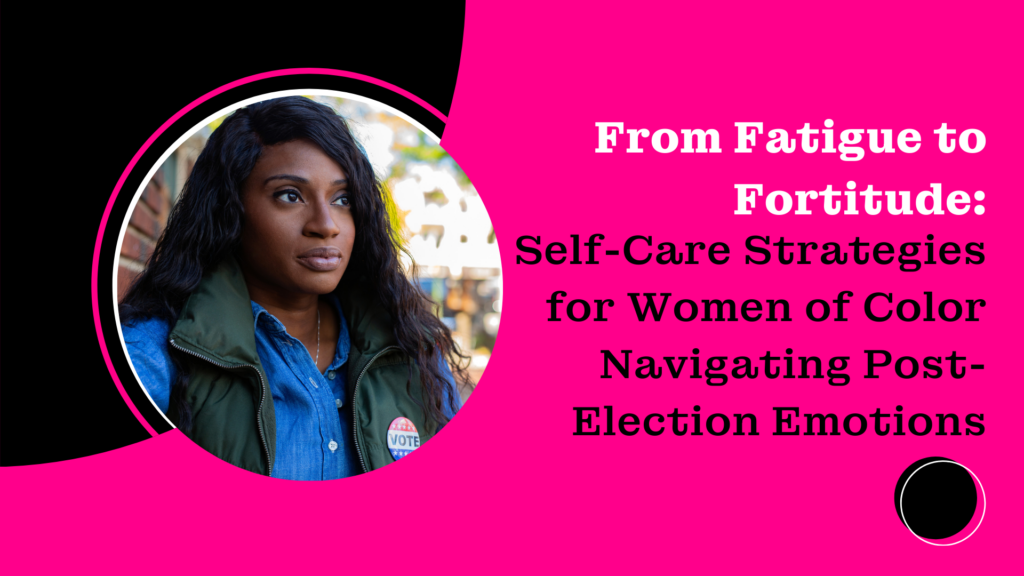
In the wake of the recent election, many of us are experiencing collective disappointment and fatigue. It can feel deeply disheartening to witness how misogynoir continues to shape the highest echelons of leadership in our government and corporate culture. Navigating these realities while managing our professional lives can feel overwhelming, especially when faced with the pressure to keep going as if these outcomes don’t profoundly affect us. Here, we want to offer actionable self-care strategies to help process these emotions while staying grounded and empowered. 1. Start with Compassion: Give Yourself Permission to Feel The first step in managing intense emotions is to give yourself permission to experience them fully. Rather than pushing feelings aside, recognize them and approach yourself with compassion. Journaling or taking time for mindfulness practices—like deep breathing or meditation—can create space to work through difficult emotions. Acknowledging that these feelings are valid is the foundation of resilience (and therefore, resistance). In challenging moments, self-compassion allows you to release expectations of being “okay” right away and focus on accepting yourself as you are. Remember that emotions are natural responses to intense events, and it’s okay to take time to process them. 2. Prioritize Rest and Rejuvenation: Guard Against Burnout Emotional exhaustion often leads to physical burnout. Finding rest during emotionally charged times is essential, yet it’s often the first thing we neglect. Incorporate restful practices into your daily routine, even in small ways—a power nap, 10 minutes of no-screen time, or prioritizing sleep can go a long way. Protect your downtime by setting boundaries around news consumption or social media use to avoid unnecessary stress. By prioritizing rest, you allow your mind and body to recharge, providing the strength needed to handle the challenges of each day with more resilience. 3. Find Community Support: Connect with Others to Lighten the Load There is power in connecting with others—community can act as a buffer against isolation and help ease feelings of overwhelm. Sistas In Sales provides a unique space for women of color in sales to find that collective support, particularly in difficult times. Within the SIS community, you have access to a supportive network where you can share experiences, find encouragement, and feel heard. Consider attending a virtual SIS event or joining discussions in the member portal, where you’ll find peers who understand the complexities of your experience. This community can serve as a source of strength and a reminder that you’re not alone on this journey. 4. Cultivate a Routine Grounded in Mindfulness Mindfulness practices can ease stress and help bring focus, even on the most challenging days. Start small, incorporating deep breathing exercises or a brief morning intention to center yourself before the day begins. Mindful walking or even a simple grounding technique can help bring calm and clarity when emotions run high. Mindfulness creates mental space, helping you manage stress by returning to the present moment and fostering resilience. Taking these small steps can shift your perspective and create a more balanced day. 5. Engage in Meaningful Action to Channel Your Energy Positively If feelings of frustration or anger are difficult to manage, channeling them into purposeful actions can create a sense of agency. Engaging in advocacy, volunteering, or supporting organizations that align with your values can provide a productive outlet. Organizations like Sistas In Sales offer ways to become involved and work collectively toward change, helping you to stay connected with a broader community of like-minded women. Even small actions can transform feelings of helplessness into empowerment. By giving back to a cause or becoming involved in your community, you can contribute to positive change and find relief from a sense of powerlessness. Moving Forward with Fortitude Taking care of yourself is not just about feeling better—it’s about sustaining yourself through difficult times and coming out stronger. Through self-compassion, rest, community, mindfulness, and action, you can create a foundation of resilience that allows you to move forward with fortitude. The work toward equity, representation, and empowerment is ongoing, and it remains more vital than ever. Together, as a community, we continue to push forward, supporting each other as we reshape our society and our surroundings. This collective resilience is how we pave the way to ensure that, one day, women of color will no longer face these burdens alone.
Navigating the Workforce: Challenges and Triumphs for Women of Color
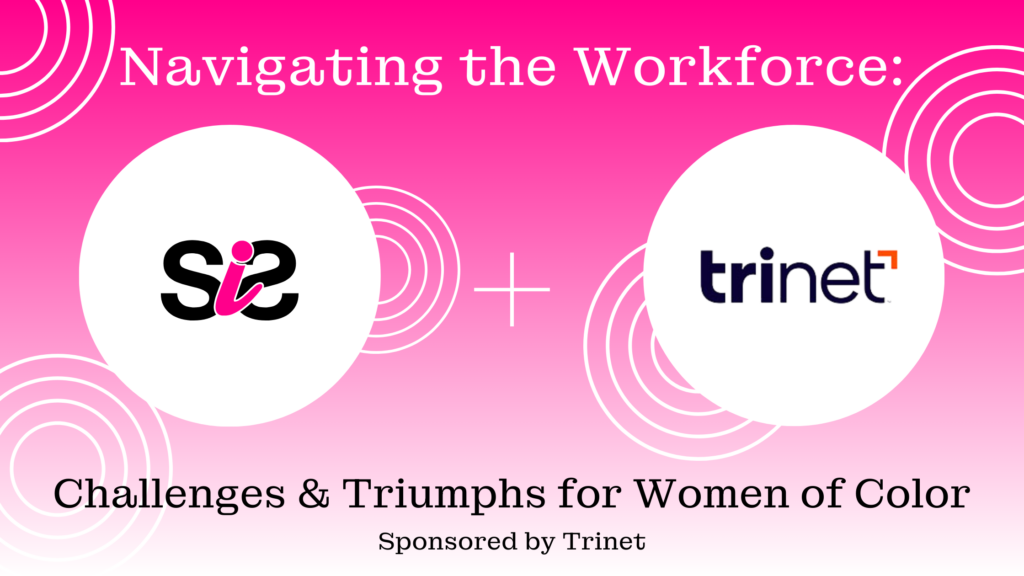
In today’s increasingly diverse workplaces, women of color bring unique perspectives, experiences, and talents to the table. However, they also face distinct challenges that can impact their career advancement and overall well-being. Let’s delve into the complexities of being a woman of color in the workforce, exploring both the hurdles they encounter and the triumphs they achieve. Five Common Challenges: Bias and Discrimination Women of color often confront systemic biases and discriminatory practices in hiring, promotion, and everyday interactions in the workplace. From microaggressions to overt acts of discrimination, navigating these obstacles can take a toll on their confidence and sense of belonging. Lack of Representation The underrepresentation of women of color in leadership positions and decision-making roles is a pervasive issue in many industries. The absence of role models and mentors who share similar backgrounds can make it challenging for women of color to envision their own paths to success and advancement. Intersectional Pressures Women of color face intersecting forms of discrimination based on both gender and race. This intersectionality compounds the challenges they encounter, as they must navigate the complexities of identity while striving to be seen and heard in predominantly white and male-dominated spaces. Wage Disparities Despite making significant contributions to their organizations, women of color often face wage disparities compared to their white counterparts and male colleagues. These disparities not only perpetuate economic inequality but also undermine their financial security and professional value. Tokenization In some cases, women of color may be tokenized or pigeonholed into diversity initiatives without being afforded meaningful opportunities for career growth and advancement. Being viewed solely through the lens of diversity can diminish their professional achievements and contributions. Five Positive Advantages: Resilience and Tenacity Despite facing numerous challenges, women of color demonstrate remarkable resilience and tenacity in the face of adversity. They draw strength from their cultural backgrounds, experiences, and support networks to navigate barriers and pursue their professional goals. Unique Perspectives Women of color bring diverse perspectives and insights to the workplace, enriching decision-making processes, innovation, and problem-solving. Their unique backgrounds and experiences enable them to offer fresh ideas and solutions that drive organizational success. Community and Support Building strong networks and communities of support is essential for women of color in the workforce. Through mentorship, allyship, and affinity groups, they find solidarity, guidance, and opportunities for professional development and advancement. Trailblazing Leadership Despite facing systemic barriers, many women of color emerge as trailblazers and leaders in their respective fields. Their trailblazing leadership inspires future generations of women of color and paves the way for greater diversity and inclusion in the workforce. Advocacy and Empowerment Women of color are powerful advocates for change, pushing for greater representation, equity, and inclusivity in the workplace. Through their advocacy efforts, they drive meaningful dialogue, policy reforms, and organizational initiatives that promote diversity and empowerment for all. Being a woman of color in the workforce comes with its share of challenges and triumphs. While systemic barriers and biases persist, women of color continue to defy expectations, break barriers, and drive positive change in their organizations and industries. By amplifying their voices, advocating for equity, and fostering inclusive workplaces, we can create environments where all women of color can thrive and succeed. Bios: Malori Gholar – Director, Sales With over 30 years of sales experience as both a top contributor and people leader, Malori Gholar is a dynamic Sales Leader and strategist specializing in People, Processes, and Performance. Her passion lies in connecting her clients’ unique needs to innovative technological solutions, driving exceptional results by aligning business goals with transformative opportunities. Malori takes pride in delivering superior client experiences, focusing on creating lasting impacts and elevating businesses to new heights. Guided by her mantra of excellence, she invests wholeheartedly in her clients, company, and colleagues, nurturing relationships built on trust and integrity. A strong advocate for equality and diversity, Malori is committed to making the world a better place, both in her professional and personal life. Her fierce dedication, unforgettable smile, and unwavering support for those in her circle make her a highly sought-after leader and collaborator, loved by those who work with her. Deanna Bernard- Director, Sales Award-winning sales leader with the big picture vision, and tenacity to successfully penetrate new markets, capture market share, and accelerate top and bottom-line revenue growth. Recognized for ability to build, guide, and sustain successful sales teams. Proven accomplishments in goal-oriented sales management through expertise in business development and strategic planning capabilities.
